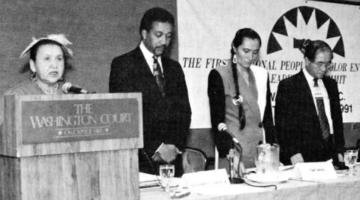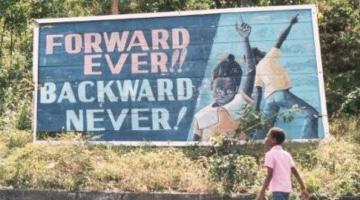BAR Book Forum: L.H. Stallings’s“A Dirty South Manifesto”
Regulation of sexuality in the United States has been predominantly shaped by and largely dependent upon safeguarding or interpreting the First Amendment.
“Listen to and refuse to be outraged by the slow tongue, practice the slow tongue, devise different ways of going down, and become connoisseurs of dirt.”
The following is an excerpt from L.H. Stallings’s book, A Dirty South Manifesto: Sexual Resistance and Imagination in the New South. It is re-printed with permission from the University of California Press. Copyright University of California Press 2019.
CHAPTER ONE
“Congress shall make no law respecting an establishment of religion, or prohibiting the free exercise thereof; or abridging the freedom of speech . . . and to petition the Government for a redress of grievances.”
Amendment 1, Constitution of the United States
(a) Findings The Congress find that—
(2) laws “neutral” toward religion may burden religious exercise as surely as laws intended to interfere with religious exercise
Religious Freedom Restoration Act, 42
U.S. Code §21 B
“The white Christian churches are another form of government in this country and they are used by the government of this country to exploit the people of Latin America, Asia, and Africa, but the day is soon coming to an end.”
James Forman, Black Manifesto
In the era of Donald Trump’s presidency, it seems clear that the First Amendment ain’t, nor ever was, for everybody. The current threat to free speech, alongside the language of religious freedom, signals why discussion of sexual resistance and imagination should begin with an examination of language and its impact on how sexual resistance is articulated, organized, and communicated. Gender and sexual resistance in the New South requires a critical skepticism of the U.S. Constitution and any subsequent local and state legislation enacted in defense and preservation of settler religion. Development and passing of bills based on the Religious Freedom Restoration Act, which was signed into existence by former President Clinton in 1993, demonstrate the importance of Forman’s warning. Forman, the former SNCC organizer, argues that religious institutions have become another form of government. Though the original federal bill was introduced because the federal government was accused of ignoring non-Christians’ religious freedom, it has now become a model for twenty-one states to develop state religious freedom restoration acts that reinscribe localized monotheistic religions’ hierarchies of gender and sexual ideology. Religious freedom, then, becomes a tactic by which to discriminate against gender and sexual minorities through house bills or redirection of public funding away from policies that could save the lives of gender and sexual minorities. Though not all states passing these bills are southern, the majority of states enacting such legislation are southern. These state religious freedom restoration acts have become the basis of the HB-blues and HB- bounce, or House Bill blues and bounce for women, children, and sexual minorities. Throughout this chapter, I discuss how current calls by southern leaders for a moral revival alongside increased attempts to develop and pass religious freedom acts suggest the necessity of alternative tactics and strategies based on literacy practices not developed from the country’s founding documents or importation of foreign religion.
“Religious freedom, then, becomes a tactic by which to discriminate against gender and sexual minorities.”
In journalist Justin Miller’s illuminating conversation with Reverend William Barber, the person he notes as the “architect of the Moral Mondays,” readers learn about the charismatic, gifted speaker and natural leader.[1] Barber, who was once president of the NAACP North Carolina chapter, took the Democratic National Convention by storm in 2016 with his remarks on faith and morality as the guiding force needed for the country. Barber has sharpened his focus on the current tide of moral conservatives in the South, explaining, “Right now in this country, the real battle is over the South, because the extremists who want to take us backwards, they still play their dog-whistle politics in the South.”[2] This manifesto is in complete agreement with Barber: the South is where important battles are being waged.
From obscenity laws and marriage acts to gender apartheid, sexual commerce, and reproductive rights, regulation of sexuality in the United States has been predominantly shaped by and largely dependent upon safeguarding or interpreting the First Amendment, which protects freedom of speech and expression of religion. In turn, histories of sexuality movements and strategies of sexual resistance demonstrate a similar reliance on these rights in political rhetoric and policy reform: from modes of public protest (boycotts, riots, marches, petitions, sit-ins, street blockages) to voting participation around bills informed by gender/sexual identity politics to acceptance of rights rhetoric and a moral authority that sustains a manifest destiny nation and its founding documents. Sexual resistance that is not anti-Black involves a process of sexual decolonization that cannot adhere to this model, even if its publicness evolves from such a framework. As Frantz Fanon exposed, the strengths of nationalism and spontaneity will never be enough: “You’ll never overthrow the terrible enemy machine, and you won’t change human beings if you forget to raise the standard of consciousness of the rank-and-file. Neither stubborn courage nor fine slogans are enough.”[3] Reactionary response from the wretched in matters of sexuality is not a sustainable approach to revolt and rebellion against colonial regimes of gender and sexuality. Sexual decolonization remains important to developing new modes of resistance. The challenge for progenitors of sexual resistance and sexual decolonization is how to advocate for thinking and feeling before acting in a twenty-first century that demands immediate response, lack of feeling, and automation. Learning and unlearning the enslaved and colonial logics of sexuality are not instantaneous or a singular event. Learning and unlearning are slow processes.
“The real battle is over the South, because the extremists who want to take us backwards, they still play their dog-whistle politics in the South.”
Language and rhetoric are as important to sexual resistance in the era of Black Lives Matter as they have been to racial and ethnic resistance in movements related to abolition of slavery, to Reconstruction, and to Civil Rights. The recovery or relearning of African and Indigenous languages cannot erase the harmful ways in which forced language practices shaped how Indigenous and enslaved populations assimilated into gender and sexual practices they did not author or narrate in their own tongue. How does one resist or revolutionize when the very element that needs to be resisted, spiritual conversion that incorporates moral authority, is typically understood as a form of salvation for church or state? As an answer, I highlight how practices and expressions within Black culture contain literacies about gender and sexuality that differ from those within English-language national rights discourses and disavow moral authoritarianism.
In this chapter, I juxtapose Black southern R & B literacy practices and rhetorical tropes used to usurp moral authority in the 1970s against current calls for a moral revival in the contemporary Moral Mondays movement, since the first is an oppositional response to Civil Rights strategies of respectability politics and the latter is influenced by Civil Rights strategies.
HOW TO READ THE MANIFESTOS AND RESIST THE PERILS OF MORAL AUTHORITY
Since these manifestos are about aesthetics as much as politics, the first manifesto—the Slow Tongue Manifesto—attends to form and aesthetics. Manifesto authors typically advocate for some type of literacy in order to fully grasp, comprehend, utilize, and then teach a manifesto. So, let me state it plainly: we need to know how to read these manifestos to understand these manifestos. Because sexual education in the United States is neither comprehensive nor liberatory, a primary process in sexual resistance has entailed heralding literacy practices that are written, oral, visual, and performative. As simple as it sounds, (il)literacy forms the basis of beliefs, miseducation, or knowledge about gender and sexuality. As enslaved Africans and their descendants in the Americas learned languages different than their mother tongues, their shared communal literacy practices weren’t simply focused on learning English, Spanish, or Portuguese letters and systems of grammar. These communities also ascertained how to share, translate, and adapt multiple forms and mediums of their own languages and cultures into foreign languages and vice versa so as to survive displacement and ensure freedom. From forged passes and escape paths etched in outhouses and quilts to reading newspapers of abolitionist activism and other possible slave rebellions, multiliteracy was understood as central to physical escape not simply as formal education geared toward upward class mobility. The secretive and criminalized practice of acquiring literacy ensured it as a coveted skill, but it also ensured a range of subversive tactics for how to approach freedom. Sexual literacy as a practice of resistance and freedom is at the heart of this Dirty South manifesto. Sexual resistance movements have emphasized and must continue to emphasize how the creation of different texts and the acquiring of multimodal literacy skills (embodied, affective, discursive, oral, sensorial, and cognitive) produce skills of survival and worldmaking. Knowing how to read, write, and feel a range of texts on and about what has been constructed as gender and sexuality in various communities, and in multiple languages, can assist gender and sexual revolutionaries from being distracted by an underlying singular narrative of moral authority where illiteracy structures oppressive policies.
To understand the role of literacy in sexual resistance in the New South, we must do four things: listen to and refuse to be outraged by the slow tongue, practice the slow tongue, devise different ways of going down, and become connoisseurs of dirt. In the Dirty South, mapped by sound and sexual cultures, a slow tongue will not only save your life; it will make the life saved worth living. A South mapped by sound and sexual culture makes the most sense given the economic changes from agrarian to industrial and energy economies, and from industrial to pharmaceutical, digital, and medical. Birth certificates and citizenship narratives, then, are replaced with life certificates, with line entries that utilize information from new maps charted via histories of labor, as well as with vinyl records that provide a record of origins and existence for people and their modes of resistance—arrangements of notes and archives of sound, material entries from which to break open someone else’s lyrics, song, or narrative structure about what it means to be a good or natural citizen or righteous human being.
“In the Dirty South, mapped by sound and sexual cultures, a slow tongue will not only save your life; it will make the life saved worth living.”
Snort in disbelief if you dare, but in 2017 the number one producer of pork foods and hog farms, Smithfield Foods, founded in Virginia in 1932, was also one of the top producers of the lifesaving drug heparin. Extracted from pig intestines, heparin is an effective anticoagulant. Smithfield Foods, under the rhetoric of sustainability and “food responsibility,” recently expanded into Smithfield Bioscience. Together, they intend to make use of swine in ways previously unimagined: from immunology to tissue regeneration and organ transplants.[4] Ironically, this is the same company that—unsurprisingly, given that many states in the southern United States are right-to-work states—fought against workers’ unionization for almost two decades in its North Carolina plants.[5] With its new futuristic and profitable mission, Smithfield Bioscience will not only be writing a new chapter of economic industry in the South, but will also be rewriting what it means to be human and animal, probably without ever shifting the regional narrative of morality and moral authority being challenged in this book. This is the New South, but it is also the Dirty South. Akin to Smithfield’s model of sustainability science, this manifesto illuminates sonic sustainability to counter dominant southern politics with their fixed moral stance against gender and sexuality fluidity. Some southerners have been producing a soundtrack to accompany what is coming, and others know that the marginalized and dispossessed require literacy practices situated in techniques of the arts to produce an imagination that will facilitate their survival and liberation. Radical sexual resistance in the twenty-first century South begins with a slow tongue, and there is no better theorization of a slow tongue than that provided by Georgia native Mildred Virginia Jackson otherwise known as Millie Jackson, someone southern hip-hop has sampled over the years.
L.H. Stallings is Professor of African American Studies at Georgetown University.
[1] Justin Miller, “Reverend William Barber Is on a Mission from God: Change the Country’s Moral Narrative,” American Prospect, August 22, 2016, http://prospect.org/article/reverend-william-barber- mission-god-change-country%E2%80%99s-moral-narrative.
[2] Miller, “Reverend William Barber.”
[3] Frantz Fanon, The Wretched of the Earth, trans. Constance Farrington (New York: Grove Weidenfeld, 1963), 135.
[4] “Smithfield Foods Introduces New Innovative Venture, Smith- field Bioscience,” Press Release, April 12, 2017,https://www.smithfield foods.com/newsroom/press-releases-and-news/smithfield-foods-introduces- new-innovative-venture-smithfield-bioscience, accessed May 6, 2019.
[5] Steven Greenhouse, “After 15 Years, North Carolina Plant Unionizes,” New York Times, December 13, 2008,https://www.nytimes .com/2008/12/13/us/13smithfield.html.
COMMENTS?
Please join the conversation on Black Agenda Report's Facebook page at http://facebook.com/blackagendareport
Or, you can comment by emailing us at comments@blackagendareport.com



















